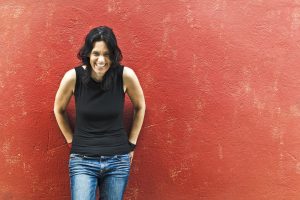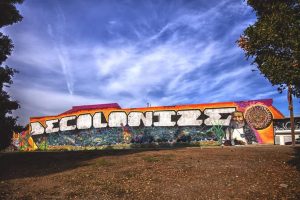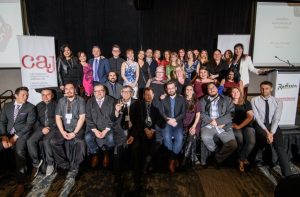Who is Indigenous? Who is not? Who gets to decide? Apparently, the colonial gatekeepers at CBC think they do, rather than Indigenous people themselves.
In February, CBC-Radio published an online article about the virtual selling platform IndigiMall, founded by Michele Young-Crook. The article stated that Young-Crook “claims to have a grandmother from the Nipissing First Nation (but who is not registered as a member of this Nation with Indigenous Services).”
The word “claims” and the bracketed qualification suggests an untruthfulness — that Young-Crook is trying to pass herself off as something she is not.
During the interview for the story, the reporter, Delphine Jung, asked multiple questions about Young-Crook’s Indigenous identity. Young-Crook believes she was being intrusively questioned because of her pale skin colour. In a follow-up email, Young-Crook offered a full explanation of her Anishinaabe roots and leadership positions in the Indigenous community. Her grandmother was from Antoine First Nation but registered with a status card to Nipissing First Nation due to an agreement between the Nations. None of this was reflected in the article.
The other Indigenous women vendors mentioned in the story were never questioned about their Indigenous identity.
When the story appeared, Young-Crook faced an onslaught of personal attacks from both vendors and shoppers among the 50,000 Facebook followers. She immediately blocked 40 people who accused her of taking up Indigenous space, of pretending to be Indigenous. Racist comments posted on the CBC story popped up on her personal Facebook newsfeed. She blocked the CBC. She worried for herself and her children. Should she raise them in their Indigenous culture and subject them to criticism that they weren’t “Indigenous enough?”
Distressed, Young-Crook and her director of marketing for IndigiMall reached out to the reporter and CBC-Radio, asking them to retract the word “claim.” The journalist doubled down, stating “As she [Young-Crook] isn’t registered as Native, I can’t say she is.” They then asked the CBC to take down the article who also refused that request.
The CBC’s own journalistic principles state that “All Canadians, of whatever origins, perspectives, and beliefs, should feel that our news and current affairs coverage is relevant to them and lives up to our principles. We have a special responsibility to reflect regional and cultural diversity, as well as fostering respect and understanding across regions.” (CBC, “Who We Are”)
Frustrated by the CBC’s inaction, Young-Crook turned to us, her Indigenous women friends, for support. After a few discussions, we decided to host a townhall on May 1 called “Decolonizing the Media” to suggest routes of dismantling colonial power structures and educating journalists about colonial practices and harmful language that further marginalizes Indigenous folks. Some 25 individuals joined our talking circle. (If you missed this event and would like information or to join our mailing list, please e-mail [email protected].)
We expressed concern that people in media with an overt colonial mindset propagate misinformation about Indigenous folks and contribute to the oppression, marginalization, and discrimination of Indigenous people. It’s not the media’s place, and certainly not the place of a non-Indigenous settler, to dictate, police or play gatekeeper as to who is and who is not Indigenous.
The concept of “status” was established via the Indian Act in 1876 by a colonial government that was seeking forced assimilation (at best) and cultural genocide (at worst) of Indigenous peoples. The government’s ultimate aim was to “get rid of the Indian problem.” Conveying “status” has been problematic since inception and has nothing to do with Indigenous heritage.
The Indian Act itself is profoundly colonial, racist and sexist. It conferred “status” on some First Nations people while stripping “status” from approximately 117,000 others. For example, if an Indigenous woman married a white man, she lost her “status” under the Act. Whereas if a white woman married an Indigenous man, she gained “status.”
The Government of Canada now acknowledges that First Nations peoples include both “status and non-status Indians.”
To question Young-Crook’s Indigeneity because she is not status strips her of her voice, agency and erases her and her family’s deep-rooted history on these lands. This is the epitome of oppression — when someone in a place of power and privilege dictates who and how someone is or isn’t.
We implore the CBC to acknowledge, take responsibility and apologize for their harmful words.
We also stand to take back our collective identity and to stand up to the oppression, racism and marginalization that continues to bombard Indigenous communities.
Whether you are status or non-status, live on or off reserve, are of mixed heritage, light or dark skin, First Nations, Métis or Inuit, urban dwelling, grew up with your culture or not — you ARE Indigenous. Do not let anyone tell you differently.
Want to stand with us?
Here is a suggested reading list that will help you become an ally and stand against racism and discrimination in the media and CBC specifically.
- CBC’s Misuse of Genealogy to Attack Indigenous Identity, written by Daniel Voshart, highlights a disturbing history of CBC’s journalists writing about Indigenous identity, relying on “expert” in genealogy Dominique Ritchot, who cites Nazi-era eugenics.
- CBC News published an article on Dec. 17, 2020 questioning filmmaker Michelle Latimer’s Indigeneity — and the network cancelled her show, “Trickster.” After five months of silence, Michelle Latimer released updated information about her ancestry through the Globe and Mail.
- On May 26, Latimer announced she is suing the CBC for $200M.
To advocate that the CBC ensures journalists take Indigenous history training if they wish to write about Indigenous Peoples. please sign this petition, Prevent Media Gatekeeping: Protect Indigenous Narratives.
Related Reading

A Cure for White Ladies
A renowned Indigenous storyteller decolonizes early settler stories of “roughing it in the bush.”

Decolonizing Our Hearts
A workshop on the topic provokes months of contemplation on how to see the world anew.

News So White It’s Blinding
Lack of diversity in media is bad for democracy, business, and justice. And readers. But what’s the solution?
Who is Indigenous? Who is not? Who gets to decide? Apparently, the colonial gatekeepers at CBC think they do, rather than Indigenous people themselves.
In February, CBC-Radio published an online article about the virtual selling platform IndigiMall, founded by Michele Young-Crook. The article stated that Young-Crook “claims to have a grandmother from the Nipissing First Nation (but who is not registered as a member of this Nation with Indigenous Services).”
The word “claims” and the bracketed qualification suggests an untruthfulness — that Young-Crook is trying to pass herself off as something she is not.
During the interview for the story, the reporter, Delphine Jung, asked multiple questions about Young-Crook’s Indigenous identity. Young-Crook believes she was being intrusively questioned because of her pale skin colour. In a follow-up email, Young-Crook offered a full explanation of her Anishinaabe roots and leadership positions in the Indigenous community. Her grandmother was from Antoine First Nation but registered with a status card to Nipissing First Nation due to an agreement between the Nations. None of this was reflected in the article.
The other Indigenous women vendors mentioned in the story were never questioned about their Indigenous identity.
When the story appeared, Young-Crook faced an onslaught of personal attacks from both vendors and shoppers among the 50,000 Facebook followers. She immediately blocked 40 people who accused her of taking up Indigenous space, of pretending to be Indigenous. Racist comments posted on the CBC story popped up on her personal Facebook newsfeed. She blocked the CBC. She worried for herself and her children. Should she raise them in their Indigenous culture and subject them to criticism that they weren’t “Indigenous enough?”
Distressed, Young-Crook and her director of marketing for IndigiMall reached out to the reporter and CBC-Radio, asking them to retract the word “claim.” The journalist doubled down, stating “As she [Young-Crook] isn’t registered as Native, I can’t say she is.” They then asked the CBC to take down the article who also refused that request.
The CBC’s own journalistic principles state that “All Canadians, of whatever origins, perspectives, and beliefs, should feel that our news and current affairs coverage is relevant to them and lives up to our principles. We have a special responsibility to reflect regional and cultural diversity, as well as fostering respect and understanding across regions.” (CBC, “Who We Are”)
Frustrated by the CBC’s inaction, Young-Crook turned to us, her Indigenous women friends, for support. After a few discussions, we decided to host a townhall on May 1 called “Decolonizing the Media” to suggest routes of dismantling colonial power structures and educating journalists about colonial practices and harmful language that further marginalizes Indigenous folks. Some 25 individuals joined our talking circle. (If you missed this event and would like information or to join our mailing list, please e-mail [email protected].)
We expressed concern that people in media with an overt colonial mindset propagate misinformation about Indigenous folks and contribute to the oppression, marginalization, and discrimination of Indigenous people. It’s not the media’s place, and certainly not the place of a non-Indigenous settler, to dictate, police or play gatekeeper as to who is and who is not Indigenous.
The concept of “status” was established via the Indian Act in 1876 by a colonial government that was seeking forced assimilation (at best) and cultural genocide (at worst) of Indigenous peoples. The government’s ultimate aim was to “get rid of the Indian problem.” Conveying “status” has been problematic since inception and has nothing to do with Indigenous heritage.
The Indian Act itself is profoundly colonial, racist and sexist. It conferred “status” on some First Nations people while stripping “status” from approximately 117,000 others. For example, if an Indigenous woman married a white man, she lost her “status” under the Act. Whereas if a white woman married an Indigenous man, she gained “status.”
The Government of Canada now acknowledges that First Nations peoples include both “status and non-status Indians.”
To question Young-Crook’s Indigeneity because she is not status strips her of her voice, agency and erases her and her family’s deep-rooted history on these lands. This is the epitome of oppression — when someone in a place of power and privilege dictates who and how someone is or isn’t.
We implore the CBC to acknowledge, take responsibility and apologize for their harmful words.
We also stand to take back our collective identity and to stand up to the oppression, racism and marginalization that continues to bombard Indigenous communities.
Whether you are status or non-status, live on or off reserve, are of mixed heritage, light or dark skin, First Nations, Métis or Inuit, urban dwelling, grew up with your culture or not — you ARE Indigenous. Do not let anyone tell you differently.
Want to stand with us?
Here is a suggested reading list that will help you become an ally and stand against racism and discrimination in the media and CBC specifically.
- CBC’s Misuse of Genealogy to Attack Indigenous Identity, written by Daniel Voshart, highlights a disturbing history of CBC’s journalists writing about Indigenous identity, relying on “expert” in genealogy Dominique Ritchot, who cites Nazi-era eugenics.
- CBC News published an article on Dec. 17, 2020 questioning filmmaker Michelle Latimer’s Indigeneity — and the network cancelled her show, “Trickster.” After five months of silence, Michelle Latimer released updated information about her ancestry through the Globe and Mail.
- On May 26, Latimer announced she is suing the CBC for $200M.
To advocate that the CBC ensures journalists take Indigenous history training if they wish to write about Indigenous Peoples. please sign this petition, Prevent Media Gatekeeping: Protect Indigenous Narratives.
Related Reading

A Cure for White Ladies
A renowned Indigenous storyteller decolonizes early settler stories of “roughing it in the bush.”

Decolonizing Our Hearts
A workshop on the topic provokes months of contemplation on how to see the world anew.

News So White It’s Blinding
Lack of diversity in media is bad for democracy, business, and justice. And readers. But what’s the solution?
Who is Indigenous? Who is not? Who gets to decide? Apparently, the colonial gatekeepers at CBC think they do, rather than Indigenous people themselves.
In February, CBC-Radio published an online article about the virtual selling platform IndigiMall, founded by Michele Young-Crook. The article stated that Young-Crook “claims to have a grandmother from the Nipissing First Nation (but who is not registered as a member of this Nation with Indigenous Services).”
The word “claims” and the bracketed qualification suggests an untruthfulness — that Young-Crook is trying to pass herself off as something she is not.
During the interview for the story, the reporter, Delphine Jung, asked multiple questions about Young-Crook’s Indigenous identity. Young-Crook believes she was being intrusively questioned because of her pale skin colour. In a follow-up email, Young-Crook offered a full explanation of her Anishinaabe roots and leadership positions in the Indigenous community. Her grandmother was from Antoine First Nation but registered with a status card to Nipissing First Nation due to an agreement between the Nations. None of this was reflected in the article.
The other Indigenous women vendors mentioned in the story were never questioned about their Indigenous identity.
When the story appeared, Young-Crook faced an onslaught of personal attacks from both vendors and shoppers among the 50,000 Facebook followers. She immediately blocked 40 people who accused her of taking up Indigenous space, of pretending to be Indigenous. Racist comments posted on the CBC story popped up on her personal Facebook newsfeed. She blocked the CBC. She worried for herself and her children. Should she raise them in their Indigenous culture and subject them to criticism that they weren’t “Indigenous enough?”
Distressed, Young-Crook and her director of marketing for IndigiMall reached out to the reporter and CBC-Radio, asking them to retract the word “claim.” The journalist doubled down, stating “As she [Young-Crook] isn’t registered as Native, I can’t say she is.” They then asked the CBC to take down the article who also refused that request.
The CBC’s own journalistic principles state that “All Canadians, of whatever origins, perspectives, and beliefs, should feel that our news and current affairs coverage is relevant to them and lives up to our principles. We have a special responsibility to reflect regional and cultural diversity, as well as fostering respect and understanding across regions.” (CBC, “Who We Are”)
Frustrated by the CBC’s inaction, Young-Crook turned to us, her Indigenous women friends, for support. After a few discussions, we decided to host a townhall on May 1 called “Decolonizing the Media” to suggest routes of dismantling colonial power structures and educating journalists about colonial practices and harmful language that further marginalizes Indigenous folks. Some 25 individuals joined our talking circle. (If you missed this event and would like information or to join our mailing list, please e-mail [email protected].)
We expressed concern that people in media with an overt colonial mindset propagate misinformation about Indigenous folks and contribute to the oppression, marginalization, and discrimination of Indigenous people. It’s not the media’s place, and certainly not the place of a non-Indigenous settler, to dictate, police or play gatekeeper as to who is and who is not Indigenous.
The concept of “status” was established via the Indian Act in 1876 by a colonial government that was seeking forced assimilation (at best) and cultural genocide (at worst) of Indigenous peoples. The government’s ultimate aim was to “get rid of the Indian problem.” Conveying “status” has been problematic since inception and has nothing to do with Indigenous heritage.
The Indian Act itself is profoundly colonial, racist and sexist. It conferred “status” on some First Nations people while stripping “status” from approximately 117,000 others. For example, if an Indigenous woman married a white man, she lost her “status” under the Act. Whereas if a white woman married an Indigenous man, she gained “status.”
The Government of Canada now acknowledges that First Nations peoples include both “status and non-status Indians.”
To question Young-Crook’s Indigeneity because she is not status strips her of her voice, agency and erases her and her family’s deep-rooted history on these lands. This is the epitome of oppression — when someone in a place of power and privilege dictates who and how someone is or isn’t.
We implore the CBC to acknowledge, take responsibility and apologize for their harmful words.
We also stand to take back our collective identity and to stand up to the oppression, racism and marginalization that continues to bombard Indigenous communities.
Whether you are status or non-status, live on or off reserve, are of mixed heritage, light or dark skin, First Nations, Métis or Inuit, urban dwelling, grew up with your culture or not — you ARE Indigenous. Do not let anyone tell you differently.
Want to stand with us?
Here is a suggested reading list that will help you become an ally and stand against racism and discrimination in the media and CBC specifically.
- CBC’s Misuse of Genealogy to Attack Indigenous Identity, written by Daniel Voshart, highlights a disturbing history of CBC’s journalists writing about Indigenous identity, relying on “expert” in genealogy Dominique Ritchot, who cites Nazi-era eugenics.
- CBC News published an article on Dec. 17, 2020 questioning filmmaker Michelle Latimer’s Indigeneity — and the network cancelled her show, “Trickster.” After five months of silence, Michelle Latimer released updated information about her ancestry through the Globe and Mail.
- On May 26, Latimer announced she is suing the CBC for $200M.
To advocate that the CBC ensures journalists take Indigenous history training if they wish to write about Indigenous Peoples. please sign this petition, Prevent Media Gatekeeping: Protect Indigenous Narratives.
Related Reading

A Cure for White Ladies
A renowned Indigenous storyteller decolonizes early settler stories of “roughing it in the bush.”

Decolonizing Our Hearts
A workshop on the topic provokes months of contemplation on how to see the world anew.

News So White It’s Blinding
Lack of diversity in media is bad for democracy, business, and justice. And readers. But what’s the solution?







